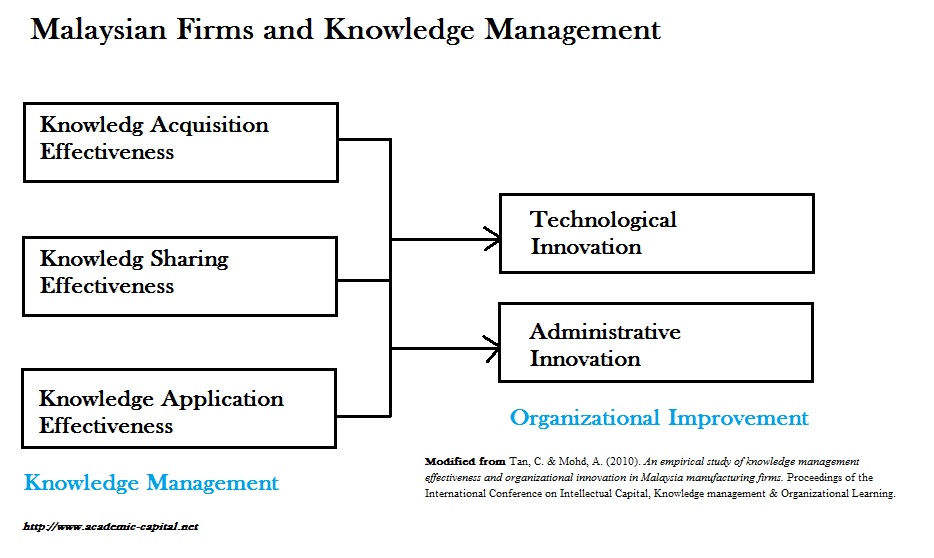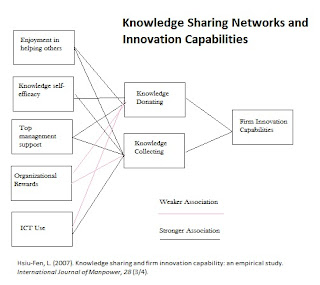Nations seek to develop new ways of competing on the
market. As the world economy sputters along the race for development continues
at a renewed pace. The Internet has afforded new ways of using information and
those industries and nations that can capitalize on knowledge acquisition the
most are likely to see growth in their revenue and subsequent GNP.
Malaysia has increased in financial and social prominence
throughout Southeast Asia. Many of the organizations have capitalized on the new
knowledge based technologies to create international competitiveness and
improve on national output (Özçelik & Taymaz, 2002). They were able to find
methods of gaining, sharing, and implementing such knowledge.
Yet such gaining, sharing and implementing is not a
onetime event. Effective innovation requires a cultural change that creates
sustained momentum (Davenport and Prusak, 1998). People should become
accustomed through their daily routines to this sharing and developing new
knowledge.
Effective application of innovation requires the
ability to put to strong use what is learned. Accordingly, knowledge gaining,
knowledge sharing, and application are key components (Zheng, 2005). Such
processes of learning, sharing, and implementation should be as efficient and
effective as possible.
Capitalizing on knowledge networks requires the
ability to effectively tie new information together in new ways to solve
problems. Gaining knowledge alone is not enough. It must be analyzed and
connected to other knowledge create and effective solution. Organizations that
are more able to effectively capitalize on this connecting of information have
significant competitive advantages.
Research by Tan and Mohd (2010)
help to highlight innovative knowledge sharing in Malaysia. A total of 674
large manufacturing firms were found in the Malaysian states of Selangor, Pulau
Pinang,
Johor, Kedah, Kuala Lumpur, and
Perak for possible testing. Of these potential contributors a total of 171
usable survey responses were returned for analysis. The purpose of the study
was to study the influence of knowledge management effectiveness on aspects of
administrative and technology innovation.
Results:
-Knowledge management has a significant impact on
firm innovation. When firms are able to share and manage knowledge both
internally among agents and externally among partners they are able to link
information for potential solutions.
-Knowledge gained should be put into training
programs for employees and then applied to the workplace.
-Pathways should be developed that allow for transference
of knowledge from company to employee, employee to employee, and employee to
company.
-Companies should help to encourage employee problem
solving abilities.
-With effective knowledge management firms will
better be able to capitalize on technology and administrative innovations.
Analysis:
Organizations that seek to develop
stronger innovation networks to capitalize on both administrative and
technological advantages need to first create these proper networks and then
the cultural routines to ensure the programs are in proper use. New knowledge
is gained through these networks by connecting information together in unique
ways to solve problems and develop more effective solutions. Effective
development of information sharing networks between organizations can lead to further
development of national growth.
Davenport, T., & Prusak, L. (1998). Working knowledge. How organization manage
what they know. Boston, MA: Harvard Business Review School Press.
Tan, C. & Mohd, A.
(2010). An empirical study of knowledge
management effectiveness and organizational innovation in Malaysia
manufacturing firms. Proceedings of the International Conference on
Intellectual Capital, Knowledge management & Organizational Learning.
Özçelik, E., &
Taymaz, E. (2002). Does Innovativeness Matter for International Competitiveness
in Developing Countries? The Case of Turkish Manufacturing Industries, (ERC
Working Papers in Economics 01/07), [online], Ankara, Turkey: Middle East
Technical University, Department of Economics, Economic Research Center. http://www.erc.metu.edu.tr/menu/series01/0107.pdf
Zheng, W. (2005). The impact
of organizational culture, structure, and strategy on knowledge management effectiveness
and organizational effectiveness. Published Doctoral of Philosophy
dissertation. University of Minnesota, United States: Faculty of The Graduate
School.

